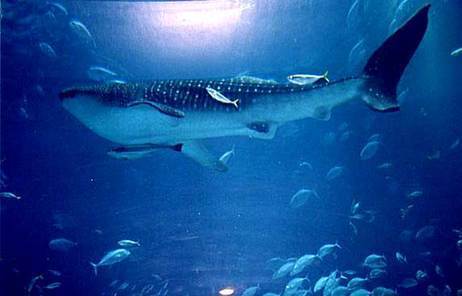Blue whales are returning to Alaska in search of food and could be re-establishing an old migration route several decades after they were nearly wiped out by commercial whalers, scientists say.
|

|
|
File photo: Blue whale [www.chinabaike.com] |
The endangered whales, possibly the largest animals ever to live on Earth, have yet to recover from the worldwide slaughter that eliminated 99 percent of their number, according to the American Cetacean Society. The hunting peaked in 1931 with more than 29,000 animals killed in one season.
The animals used to cruise from Mexico and Southern California to Alaska, but they had mostly vanished from Alaskan waters.
But several sightings of California whales in recent years off the coasts of Alaska and British Columbia suggest that the massive animals are expanding north again in search of tiny shrimp-like krill to eat, scientists contend in a recent article published in the journal Marine Mammal Science.
Researchers got an inkling of the trend in 2004 during a humpback whale survey in the Gulf of Alaska, said Jay Barlow, a scientist with the National Oceanic and Atmospheric Administration (NOAA). Three blue whales were spotted in the Gulf of Alaska.
"No one had seen blue whales in these waters since the end of whaling," Barlow said.
Researchers compared photographs of the six whales with those in a photo identification catalog dating back to the mid-1980s. One of the Gulf of Alaska whales matched a California whale. That whale had been seen five times in 1995 and 1998 near the Santa Barbara Channel off southern California.
After the 2004 sightings, John Calambokidis, a research biologist at Cascadia Research Collective in Olympia, Washington, who works with NOAA, said one or two blue whales were spotted each year off British Columbia in 2005 and 2006.
In 2007, researchers spotted five in one day near the Queen Charlotte Islands off British Columbia. Three more were spotted the next day.
Calambokidis, who compiled the blue whale photo identification catalog, said before that there had been only a couple of blue whale sightings in that area in the past 50 years.
Researchers eventually documented 15 blue whales off the coast of British Columbia and in the Gulf of Alaska that they believe are part of the California group of about 2,000 animals. Four were matched with photos in the catalog.
"We speculate that this represents the re-establishment of a traditional migration pattern for an eastern North Pacific blue whale population," the scientists say in the journal article written by Calambokidis, Barlow and others.
(China Daily via Agencies May 19, 2009)